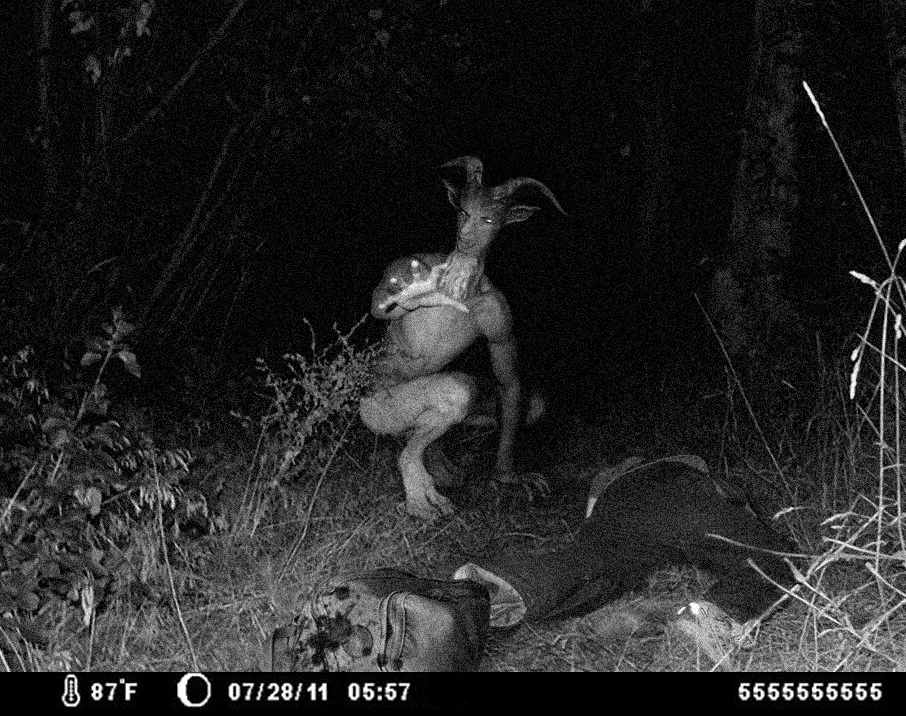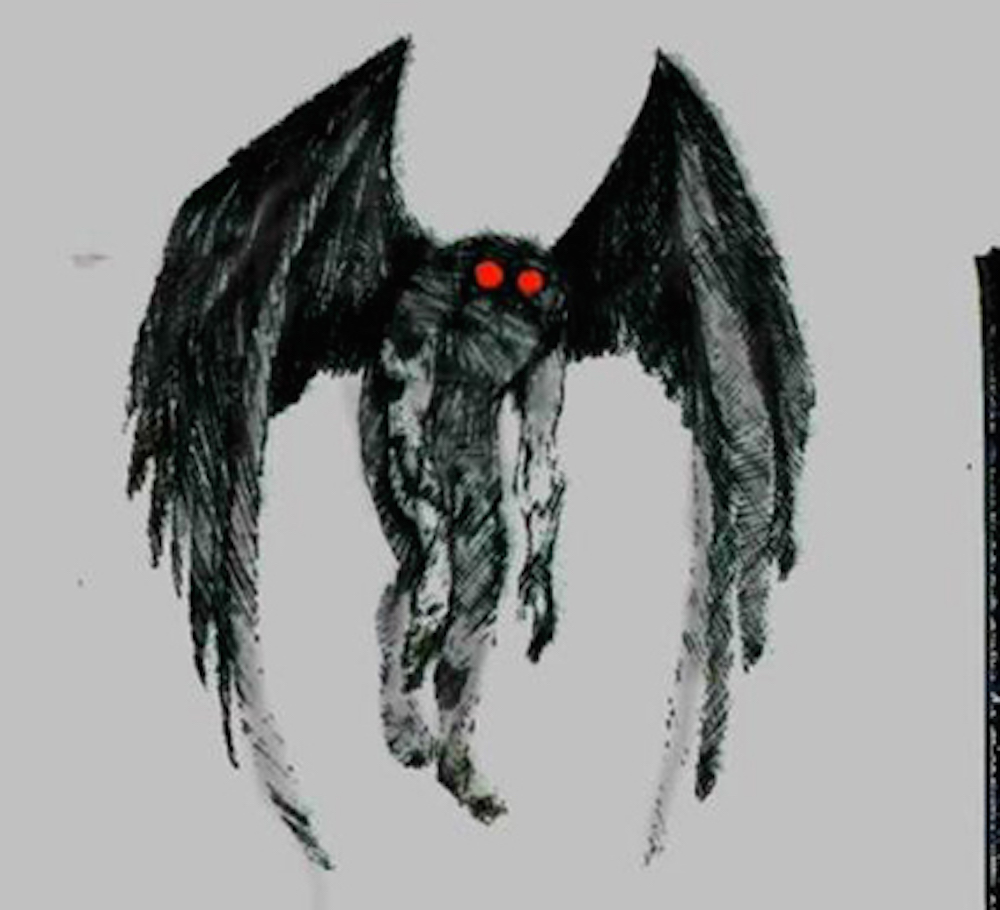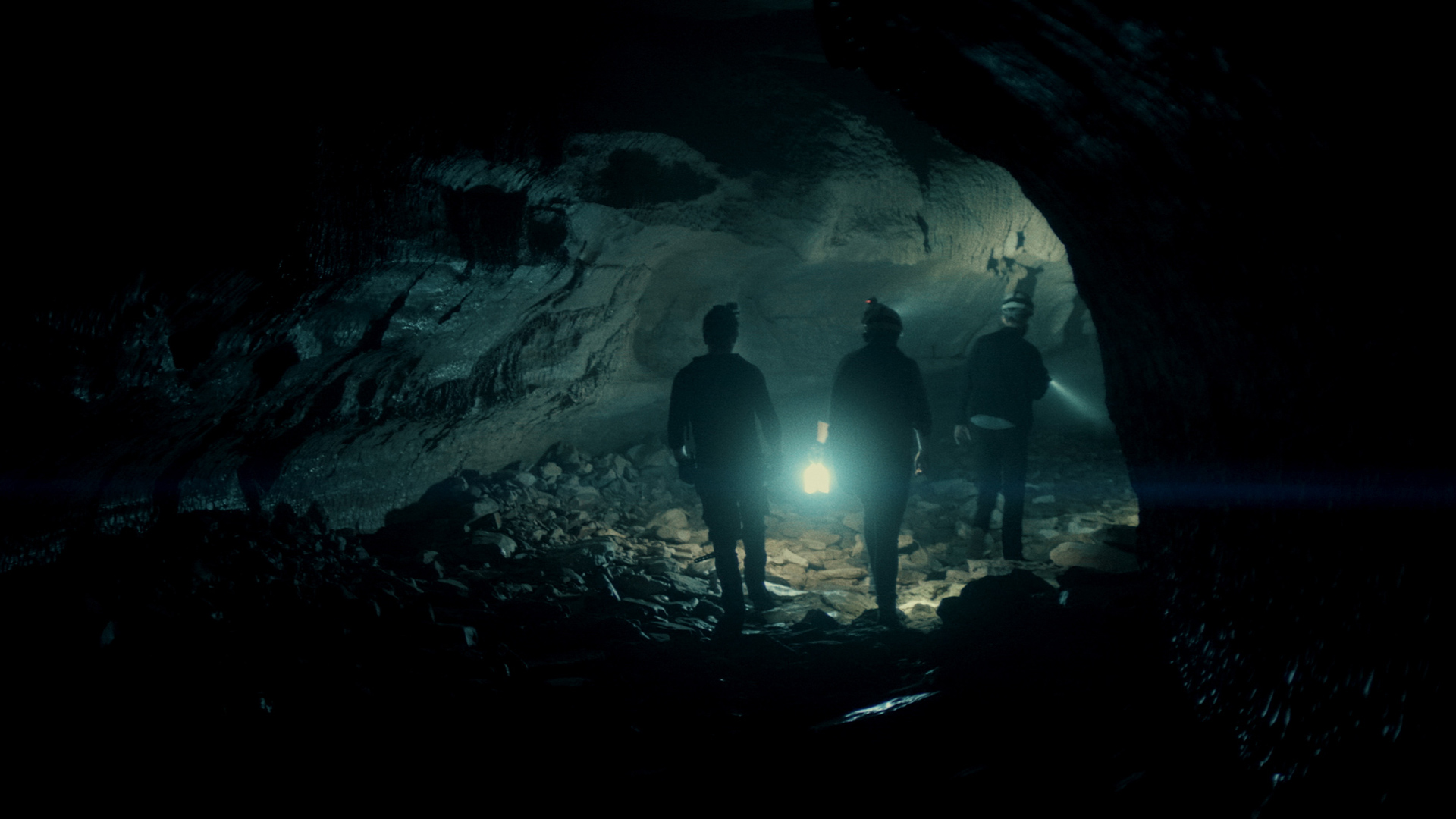
The Paranoid Traveler – Goatman, Pan, Krampus And The Devil: ’Tis The Season To Be Paranoid
- December 26, 2018
- 1
by Andrew Arnett
 What if, unbeknownst to us, and beyond the ability of our five senses to detect, their lies a vast world interpenetrating our own physical reality, in which ghosts, demons and UFOs exists? That, at least, is the theory espoused by the late paranormal researcher John Keel. Keel, of course, gained notoriety for his investigations into that dark winged cryptid called the Mothman, which terrorized the small town of Point Pleasant, West Virginia, back in the late 1960s.
What if, unbeknownst to us, and beyond the ability of our five senses to detect, their lies a vast world interpenetrating our own physical reality, in which ghosts, demons and UFOs exists? That, at least, is the theory espoused by the late paranormal researcher John Keel. Keel, of course, gained notoriety for his investigations into that dark winged cryptid called the Mothman, which terrorized the small town of Point Pleasant, West Virginia, back in the late 1960s.
Keel believed that the Mothman, as well as aliens, ETs, UFOs and the like, were not so much extraterrestrial in nature, but rather, ultraterrestrial. That is, they didn’t come down from outer space in space ships – they were already indigenous to earth, living side by side with mankind since the beginning. The reason we can’t see them is because they exist on a different rate of vibrational energy. But if energy levels are altered, like when changes occur in the earth’s magnetic field, one can catch a glimpse of these beings. In The Eighth Tower (1975), Keel writes:
“Some psychics and UFO percipients have described these occult colors, and they have always been used to symbolize the supernatural entities. If you could peer into this superspectrum, you would undoubtedly see some frightening things – strange shapes and eerie ghostlike forms moving through a sea of electrical energy like fish in some alien sea.”
In my previous article, Goatman or Ghost, Man?, I traveled to Louisville, Kentucky, with the Brooklyn Paranormal Society, to investigate the legend of the Goatman, aka the Pope Lick Monster. Was the Goatman, as Keel thought of the Mothman, a supernatural entity?
If the Goatman exists in the superspectrum overlaying the Pope Lick Trestle, then there may be a way to make contact with the beast. It was rumored that the Goatman stalks Pope Lick Trestle at midnight, giving chase to cars driving under the trestle at that time. Some say the creature can run at speeds up to 60 MPH. Witnesses claim handles had been ripped off their car doors and bloody claw prints left on the vehicle.
It was a tall tale to be sure, but we still needed to gather more evidence before we could make a determination. Three of us, Anthony Long, Devon Delatour and myself, went back to the trestle at midnight. This proved to be nerve wracking. We had surveyed the area in the clear light of day but Pope Lick Park at night was completely different. There was no one around and certainly where we were going was off limits. The creepiness level was dialed up to eleven. The darkness was oppressive as the trees themselves took on sinister shapes.
Return to Pope Lick Trestle
With our flashlights, we managed to find our way back to the trestle and begin our investigation. We were not alone. There was someone there, just off the path and lurking in the darkness under the bridge. We turned our flashlights toward the trees and a man and woman emerged.
“What’s going on?,” the man asked.
“We’re doing a paranormal investigation on the Goatman,” Anthony responded.
“We’ve heard of the Goatman,” the woman said, “They say he hangs out here, waiting to hypnotize people.”
“That’s what we heard too,” I said.
“Well, good luck with your investigation,” the man said, as the couple wandered off down the path.
There was something not quite right about the two of them. They exuded a strange aura. Perhaps there was illicit sex and/or drugs involved. The area was known, after all, to be a party destination for teenagers, but maybe the spot had become a shade more sinister in recent times.

Devon started things off with the Lesser Banishing Ritual of the Hexagram. He felt we needed as much protection as we could get. Anthony took temperature readings and set up motion detectors. I recorded the event with my video camera.
Using the M2 Ghost Hunter app, Anthony requested an audience with the spirits. The app features an EVP instrument which presents words, in both visual and audio format, based on advanced and proprietary algorithm. The first word to pop up on the app was “PRAY.” It was a surprising response and immediately threw us off guard. Anthony then asked, “If there are any spirits here, should we be here?” The EVP responded with the word “DRUNK.” It was followed by the word “DATE,” then the word “MARYANN.”
It was a weird set of responses, but one which could be associated with Pope Lick Trestle being a known local for teenagers to drink and make-out. The name Maryann may or may not have been associated with someone who had previously died there. The Spirit Box subsequently vocalized the word “Leave,” three separate times.
To be perfectly honest, we were spooked. Why should we, all grown men, after all, and street wise from New York City, be creeped out by some random gibberish coming off a phone app? Nonetheless, we were on edge. It was the overall ambiance that got to us. We did a few more experiments then, at some point, became so overwhelmed with anxiety that we packed it in and beat a hasty retreat to the car.
“What the hell just happened?” we asked each other as our car peeled out and away from Pope Lick Park. We certainly didn’t encounter any homicidal axe-wielding Goatman. There was nothing, in fact, to warrant our fear – and yet we panicked. In the clear light of day, driving back to New York City, the whole situation seemed absurd. It wasn’t until I started researching this paper that things began to make sense.
Pan Is Not Dead

The image of a half-man, half-goat chimera has been with us since at least the dawn of western civilization. In Greek mythology, this creature is deified as the god Pan, sporting horns, legs and hindquarters of a goat. Pan rules over nature, flocks, shepherds and is often associated with sexuality, fertility, the season of spring and, curiously, theatrical criticism.
Of particular interest is Pan’s association with fear, as the root word of “panic” is Pan. How did this come to be? Pan was known to love his afternoon naps. So much so that it was dangerous to disturb him. If a hapless shepherd stumbled upon the god as he slumbered in the woods, Pan would let out a violet blood-curdling shout which would overwhelm the person with anxiety and fear.
Pan used his ability to inspire fear to affect major battles, like the Battle of Marathon (490 BC), by favoring the Athenians and inspiring fear in the Persians, their enemies. Also, when the Titans attacked Olympus, Pan claimed victory by frightening the Titans to retreat. Was the panic we felt at Pope Lick Trestle inspired by Pan himself?
Another question one might ask is, why the goat? What does the goat have to do with fear? Certainly there are much worst beasts to encounter in the woods, like the bear, wolf or snake. Any of those would much sooner strike fear into the hearts of men than the amiable goat. Indeed, the devil himself has often been depicted with goat-like characteristics. What gives?

For a deeper understanding of the symbolism of the Goatman, we need to go back, to the Bible’s Book of Leviticus, where the word “scapegoat” originated. Here we find a priest, in the service of Yahweh, making an offering of a slaughtered goat to purify the tabernacle. A second goat was sent out to the desert to wander. The sins and transgressions of the community were projected onto that beast and, though not evil in itself, became a vehicle for atonement, allowing the community to reconnect with the Divine.
In society, we often apply the term scapegoat to individuals. Carl Jung associated the scapegoat with the “shadow” side of our personality. Thus, we projected the dark, sinful and shameful aspects of ourselves onto another person or group. We would cast them out, in order for us to maintain our public mask or “persona.”
The goat, and its relative, the lamb, are perfect animals to assume such a role, not because they are evil or inspire fear but on the contrary, because they are docile and pure. They are a blank slate upon which to project our negativity. The Goatman, in turn, could represent the dark side of society, perhaps even a tulpa, a paranormal entity come to life with supernatural powers.
Krampus

Of course, all this talk about an axe wielding Goatman can get kind of heavy, not exactly in keeping with the festive season of Christmas, which is fast approaching. Certainly, there is no room for the Goatman this time of year. Not so fast.
Turns out, in days of old, there was said to be a shaggy, horned, sharp clawed goat-like monster who would show up on Christmas day, with Santa Claus (Saint Nicholas) no less, to beat and carry off children into the night. This “Goatman” was called Krampus and his job was to punish misbehaving children by beating them with bundles of birch sticks, whip them with horsehair and drag them down to hell for a year in a sack.
According to Norse mythology, Krampus was said to be the son of Hel, who was the daughter of Loki. The name is derived from the German word krampen, meaning claw. No doubt, Krampus is Santa’s own shadow, but in our modern, white washed and homogenized world, there is no place for a menacing creature as Krampus.

The closest approximation we have today is Dr. Seuss’ Grinch. The beastly Grinch resembles a goat-like Krampus closely, sans the horns, and we’ve sent him off to live on a mountain top alone. But, as we’ve discovered, the Grinch/ Krampus is co-conspirators with our beloved jolly ole’ fat man in the red suit. Now, doesn’t that put a lump of coal in your stocking? ’Tis the season to be paranoid.
References
The Paranoid Traveler – Goatman Or Ghost, Man? Paranormal Investigation Louisville, KY
http://bkps.co
https://www.greekmythology.com/Other_Gods/Pan/pan.html
Jung, Carl. (1981). Collected Works of C.G. Jung (Book 28). Princeton University Press; 2nd ed. edition. ISBN-10: 0691018332
Keel, John A. (1975). The Eighth Tower. Saturday Review Press. ISBN-10: 0841504032


Comments are closed.